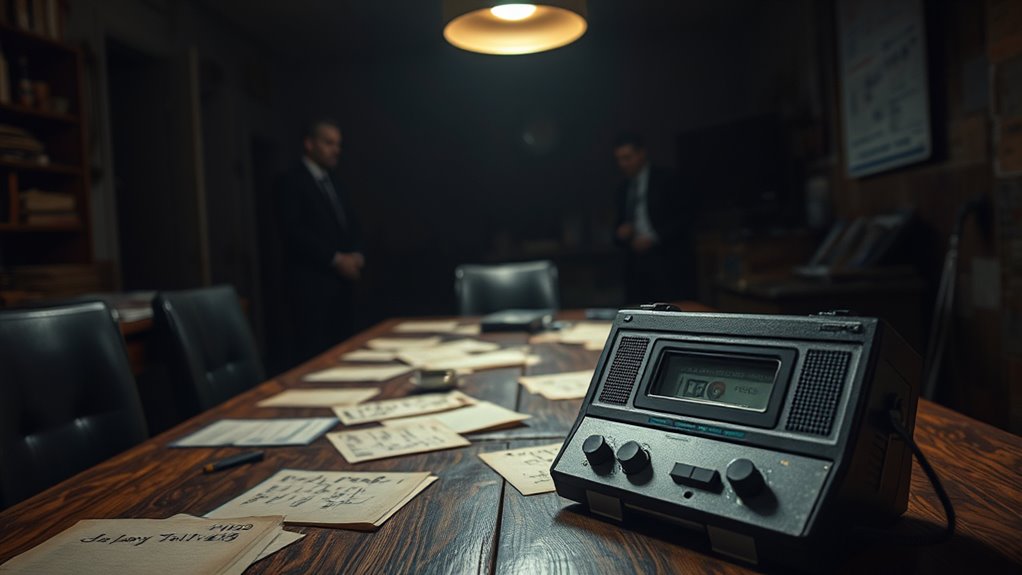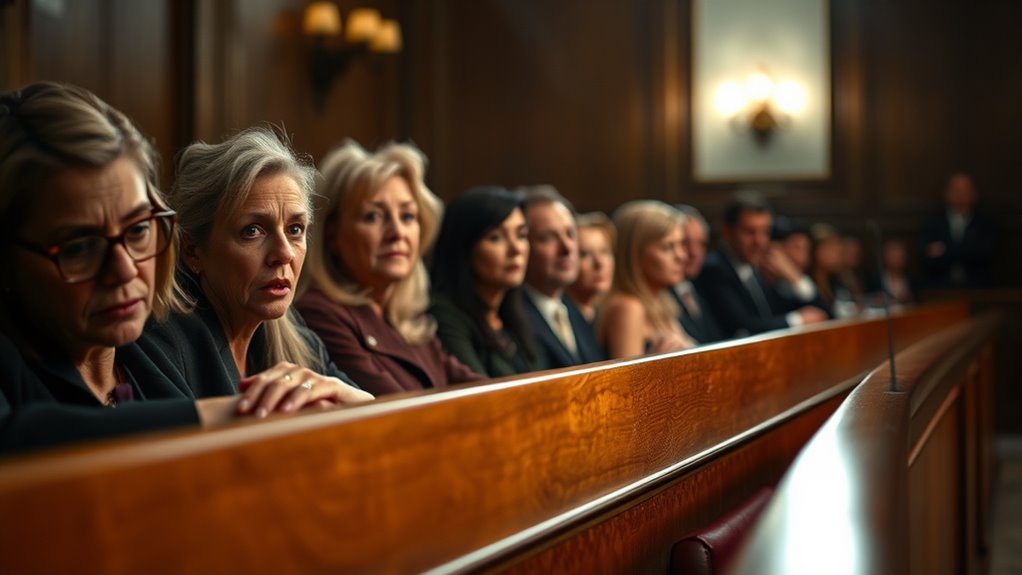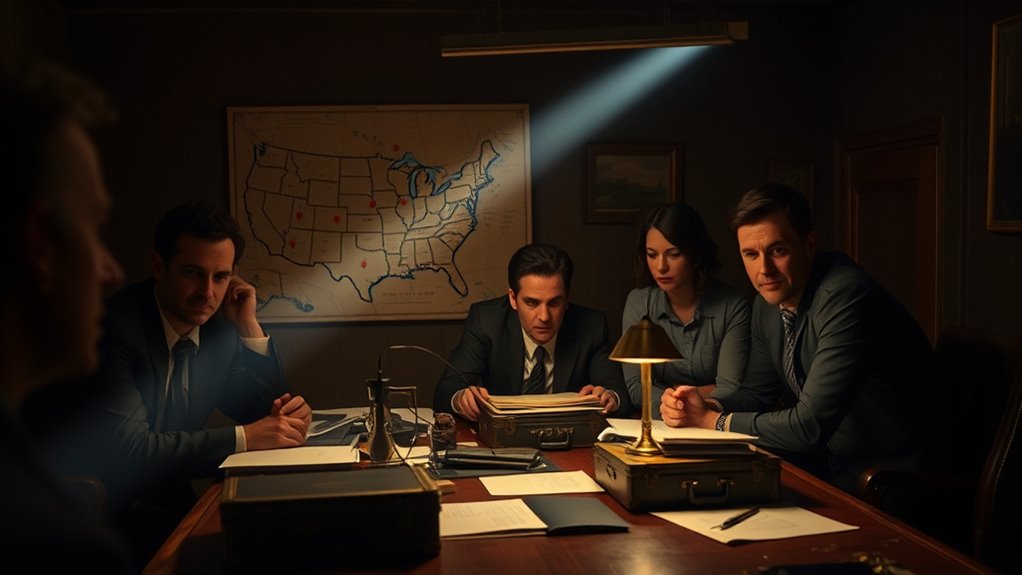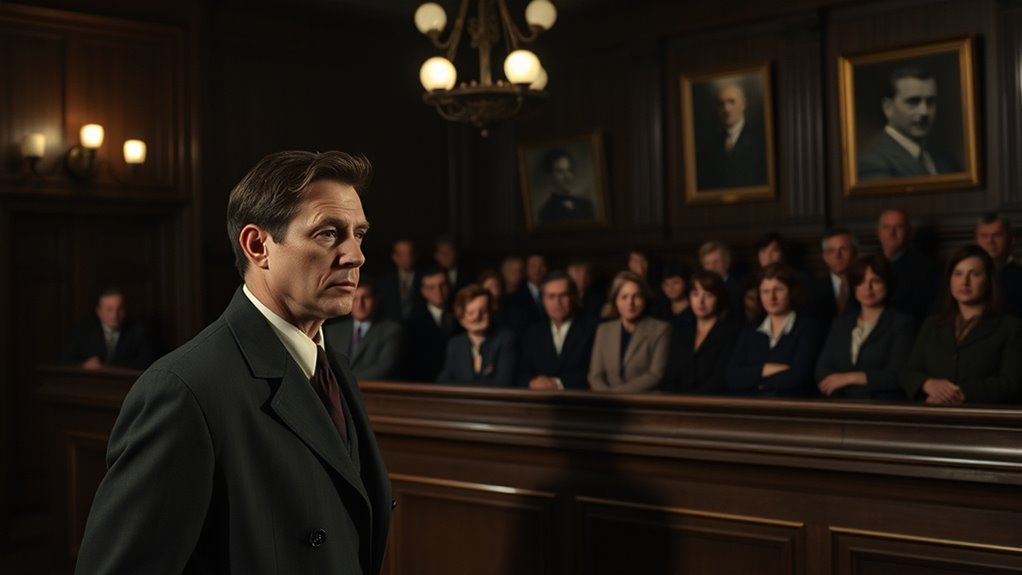One of our team’s favorite investigation moments is the Watergate Scandal. It showed how relentless journalism can hold powerful figures accountable. The break-in at the Democratic National Committee led to shocking revelations about President Nixon’s cover-ups. Woodward and Bernstein’s tenacity in uncovering the truth not only resulted in Nixon’s resignation but also changed public trust in government forever. There’s so much more to uncover about this pivotal moment that you’ll find fascinating.
Key Takeaways
- The Watergate scandal exemplifies the power of investigative journalism to hold leaders accountable and restore public trust in government.
- Upton Sinclair’s *The Jungle* not only exposed unsanitary meatpacking conditions but also catalyzed significant reforms in food safety regulations.
- The Pentagon Papers revealed the U.S. government’s misleading narratives about the Vietnam War, highlighting the importance of transparency in governance.
- The Panama Papers investigation demonstrated how collaborative journalism could uncover global corruption, leading to legal reforms and enhanced financial transparency.
- Woodward and Bernstein’s relentless pursuit of truth during the Watergate scandal inspired future generations of journalists to prioritize integrity and source protection.
Watergate Scandal: The Fall of a President

As you investigate the Watergate scandal, you’ll find it was a pivotal moment in American history that led to the fall of a president.
It all began on June 17, 1972, when five men were arrested for breaking into the Democratic National Committee headquarters. The investigation quickly unraveled a web of deceit, revealing that the break-in was part of a broader campaign funded by the Committee to Re-Elect the President.
Despite President Nixon’s denials, revelations about a cover-up emerged, culminating in televised Senate hearings. On August 5, 1974, the “Smoking Gun” tape confirmed his direct involvement, forcing Nixon to resign on August 9, 1974.
This scandal greatly altered public trust in government and set a precedent for accountability.
Upton Sinclair’s Meatpacking Exposé: A Turning Point in Food Safety

Upton Sinclair’s groundbreaking work, *The Jungle*, not only exposed the grim realities of the meatpacking industry but also ignited a national conversation about food safety.
Assigned to investigate the 1905 strike in Packingtown, Sinclair went undercover, revealing unsanitary conditions and contaminated meat. The graphic descriptions sparked public outrage, leading citizens to demand better food safety standards.
This public outcry prompted significant legislative changes, including the Pure Food and Drug Act and the Meat Inspection Act of 1906, signed by President Theodore Roosevelt.
Sinclair’s exposé not only highlighted worker exploitation but also marked a pivotal moment in American journalism and food regulation. The legacy of *The Jungle* continues to influence food safety policies today.
The Pentagon Papers: Unveiling the Truth About Vietnam

The revelations from Upton Sinclair’s *The Jungle* set a powerful precedent for investigative journalism, showing how the truth can spark significant societal change.
In the early 1970s, the Pentagon Papers disclosed the U.S. government’s extensive and often misleading involvement in Vietnam. Created between 1967 and 1969, these classified documents detailed military strategies and actions, revealing a stark contrast between government claims and reality.
When Daniel Ellsberg leaked them to *The New York Times*, the impact was immediate; the public learned about decades of deception. The Supreme Court’s ruling allowed these truths to emerge, igniting anti-war sentiment and emphasizing the media’s role in holding power accountable.
This pivotal moment reshaped public trust and set a precedent for future whistleblowers.
The Panama Papers: Exposing Global Corruption

While many may see offshore accounts as a legal gray area, the Panama Papers shattered that illusion by exposing the rampant global corruption hidden behind them.
This monumental leak of 11.5 million documents revealed over 214,000 offshore entities linked to individuals from more than 200 countries. It implicated 140 politicians, including 12 current or former world leaders, and exposed billions in secret transactions, particularly involving associates of Vladimir Putin.
The International Consortium of Investigative Journalists led this groundbreaking investigation, showcasing global collaboration and advanced data analysis techniques.
The fallout was immense: high-profile resignations, legal reforms, and a worldwide conversation about financial transparency emerged, forever changing the landscape of investigative journalism and public awareness of corruption.
Woodward and Bernstein: Masters of Investigative Journalism

Investigative journalism reached new heights with the dynamic duo of Woodward and Bernstein, whose relentless pursuit of truth during the Watergate scandal changed the media landscape forever.
Teaming up in 1972, they uncovered a web of political intrigue that led to President Nixon’s resignation. Under the guidance of editor Ben Bradlee, their collaborative effort emphasized persistence, source protection, and corroboration, often piecing together seemingly unrelated facts.
With the help of their anonymous source, Deep Throat, they exposed Nixon’s re-election committee’s dirty tricks. Their groundbreaking work earned them a Pulitzer Prize and inspired countless journalists.
Through the publication of “All the President’s Men” and its film adaptation, Woodward and Bernstein became cultural icons, solidifying their legacy in journalism.
The O.J. Simpson Murder Trial: A Media Sensation

How did a murder trial turn into a media circus? The O.J. Simpson murder trial captivated the nation from January to October 1995, becoming one of the most publicized cases in U.S. history.
With the shocking murders of Nicole Brown Simpson and Ronald Goldman, the media frenzy began. The infamous Bronco chase on June 17, 1994, drew approximately 95 million viewers, setting the stage for the courtroom drama that followed.
As the trial unfolded, gripping moments like the glove fitting incident and dramatic testimonies from key figures kept everyone glued to their screens.
O.J.’s acquittal on October 3, 1995, shocked the public, highlighting deep racial divides and raising questions about justice and media influence in high-profile cases.
The Rosenbergs Espionage Case: Cold War Intrigue

As America grappled with the fallout of the O.J. Simpson trial, another gripping case unfolded: the Rosenbergs’ espionage trial. Julius and Ethel Rosenberg faced accusations of passing atomic bomb secrets to the Soviet Union in 1950.
Their conviction under the Espionage Act of 1917 shocked many, especially as they became the only American civilians executed for espionage during the Cold War. Key witnesses like Harry Gold and David Greenglass played critical roles, though Greenglass later admitted to lying about Ethel’s involvement.
The public’s debate over their guilt intensified amid Cold War paranoia, with many believing Ethel was wrongfully executed. This case highlights the era’s fear and the lasting impact of the Red Scare on American justice.
The Lindbergh Baby Kidnapping: Justice and Legal Reforms

Though the Lindbergh baby kidnapping gripped the nation with its shocking brutality, it also sparked significant legal reforms that would shape the future of criminal justice in America.
The case, involving the kidnapping of Charles Lindbergh Jr. in 1932, led to the enactment of the “Lindbergh Law,” which made kidnapping across state lines a federal crime. This legislation established federal jurisdiction over such cases and introduced severe penalties, including the death penalty.
The trial of Bruno Hauptmann highlighted the influence of media on public opinion and the challenges of ensuring a fair trial. Ultimately, the case underscored the delicate balance between press freedom and judicial integrity, leaving a lasting impact on American legal practices surrounding high-profile crimes.
The Impact of Investigative Journalism on Society

Investigative journalism plays an essential role in shaping society by empowering citizens with the information they need to hold those in power accountable.
It enhances democracy, acts as a watchdog against corruption, and fosters transparency within governmental and corporate systems. By uncovering hidden truths about crime, corruption, and human rights abuses, it challenges the status quo and inspires collective action for change.
Investigative reports often influence public policy, prompting lawmakers to address systemic issues. Furthermore, this journalism raises awareness about critical social concerns, motivating public engagement and debate.
Despite facing challenges like high costs and legal barriers, investigative journalism remains crucial for democracy, providing a platform for the voiceless and contributing to tangible societal improvements.
Frequently Asked Questions
What Motivates Journalists to Pursue Investigative Stories?
Journalists pursue investigative stories for various reasons. You’re driven by a desire for transparency and accountability, aiming to expose corruption and abuse of power.
You want to spark social change and advocate for marginalized groups, ensuring justice is served. Professional integrity and ethical considerations also motivate you, as does the challenge of uncovering hidden truths.
With technology enhancing your capabilities, you’re keen to tell compelling stories that make a difference.
How Do Journalists Protect Their Sources During Investigations?
Journalists dance on a tightrope when protecting their sources during investigations. You’ve got to build trust by ensuring confidentiality, often promising anonymity to encourage sensitive information sharing.
Using secure communication tools and limiting access to source details helps minimize risks. Regularly evaluating potential threats and employing verification methods solidifies the integrity of your sources.
What Role Does Public Interest Play in Investigative Journalism?
Public interest is crucial in investigative journalism because it guides what stories you pursue.
When you focus on issues affecting society’s health, safety, or governance, you amplify the voices of the community.
By exposing corruption and holding power accountable, you promote transparency and encourage civic engagement.
Your investigations not only inform the public but also serve as a watchdog, ensuring that those in authority act ethically and responsibly.
How Has Technology Changed Investigative Reporting Methods?
Technology’s revolutionized investigative reporting methods in numerous ways.
You can leverage immersive storytelling through VR and AR, enhancing audience engagement. Enhanced fact-checking tools guarantee your reports are accurate.
AI assists in data analysis, while online databases streamline research. With multiple digital platforms, you can publish findings globally and interact with your audience for instant feedback.
Are There Risks Involved in Investigative Journalism?
Imagine uncovering a scandal that could shake powerful figures to their core.
But guess what? Investigative journalism isn’t all glory; it’s fraught with risks. You face legal threats, financial constraints, and even physical danger. Online harassment looms, and the pressure to meet deadlines can lead to costly mistakes.
With every revelation, you risk your safety, reputation, and mental well-being. Yet, the pursuit of truth drives you forward, despite the lurking dangers.
Conclusion
So, there you have it—our favorite moments in investigative journalism, where truth is stranger than fiction and every scoop is a plot twist waiting to happen. From political scandals to sensational trials, it’s like a never-ending reality show but with fewer Kardashians. Who needs scripted drama when real life serves up such juicy stories? Remember, the next time you read the news, you’re not just getting facts; you’re tuning in to the wildest show on Earth—no popcorn required.









